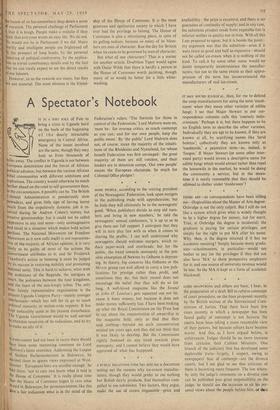SOME PEOPLE, according to the retiring president of the Newsagents'
Federation, look upon mergers in the publishing trade with apprehension; but he feels they will ultimately be to the newsagents' good. 'When publishers decide to stop old num- bers and bring in new numbers,' he told the newsagents' annual conference, 'it is up to us to give them our full support. I anticipate that they will in turn play fair with us when it comes to sharing the profits.' I can well understand why newsagents should welcome mergers, which re- duce paper-work and overheads; but for the public, the trend towards monopoly in the pos- sible absorption of Newnes by Odhams is depress- ing. In theory, big concerns like Odhams or the Mirror group can well afford to carry a few pub- lications for prestige rather than profit, and sometimes they do; but their record does not encourage the belief that they will do so for long. A well-loved magazine like the Strand or John 0' London's gets squeezed out not be- cause it loses money, but because it does not make money sufficiently fast. I have been looking up what the Royal Commission on the Press had to say about the concentration of ownership in the magazine field; only to find that they said nothing—because no such concentration existed ten years ago, and they did not think that it was likely to develop. But the Commission rightly frowned on any trend towards press monopoly; and I cannot believe they would have approved of what has happened.














































 Previous page
Previous page